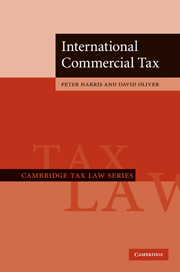Book contents
- Frontmatter
- Contents
- Preface
- List of abbreviations
- Table of Cases
- Table of statutes
- Table of treaties
- Introduction
- 1 Fundamentals and sources of international tax law
- 2 The jurisdiction to tax
- 3 Source country taxation
- 4 Residence country taxation
- 5 The limited scope of treaties
- 6 Changes of source and residence
- 7 Bilateral administrative issues
- Conclusion
- References
- Index
4 - Residence country taxation
Published online by Cambridge University Press: 03 May 2011
- Frontmatter
- Contents
- Preface
- List of abbreviations
- Table of Cases
- Table of statutes
- Table of treaties
- Introduction
- 1 Fundamentals and sources of international tax law
- 2 The jurisdiction to tax
- 3 Source country taxation
- 4 Residence country taxation
- 5 The limited scope of treaties
- 6 Changes of source and residence
- 7 Bilateral administrative issues
- Conclusion
- References
- Index
Summary
The discussion now proceeds to consider the tax treatment in the country where the income recipient is resident on the assumption that the source country has taxed in the manner discussed in Chapter 3. Accordingly, in the context of the Base Case (see the figure on page 5), the discussion in this chapter considers the tax treatment of Beth by Country B on the assumption that the rent from her office building in Country A has been taxed by Country A on the basis of source. This assumption is consistent with the principle of source country entitlement discussed above at 2.2.1. Consistent with the discussion in Chapter 3, there are cases in which the source country might not tax, such as where the income involved is royalties or business income in the absence of a PE. In such a case, residence country taxation is straightforward and there is no issue of that country providing foreign tax relief.
In most cases, however, the source country will tax. This is true in the context of the Base Case, where Country A is very likely to tax the rent because it is income from immovable property. Assuming the source country taxes, it will typically do so without reference to taxation by the residence country. By contrast, the residence country will typically take into account any tax levied by the source country. For this reason, the residence country usually has the final say as to the overall tax liability of the recipient.
- Type
- Chapter
- Information
- International Commercial Tax , pp. 264 - 342Publisher: Cambridge University PressPrint publication year: 2010

